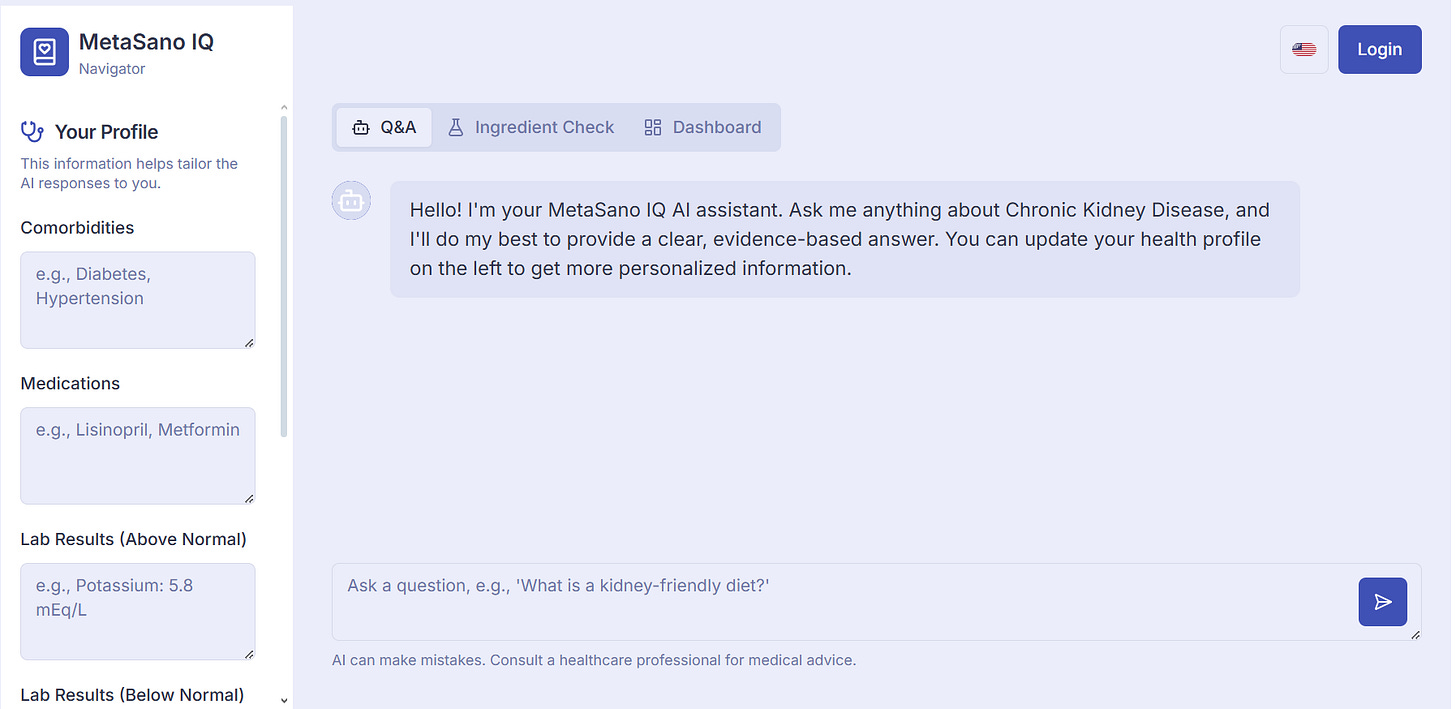Why you should be cautious trusting a “default” AI tool for chronic kidney disease — and what we’re doing about it
MetaSano Launches the First AI Trained in Kidney Science to Deliver Safe, Accurate Answers for People with CKD
In the rapidly evolving landscape of artificial intelligence in healthcare, there’s growing evidence that using a general-purpose AI for medical questions — especially for complex conditions like chronic kidney disease (CKD) — can carry serious risks. For instance, a recent study published in the American College of Physicians (ACP) affiliated journal found that popular AI chatbots could be easily manipulated to produce authoritative-sounding but false medical advice, complete with fabricated references.
That finding underscores two core problems when you use a generic AI to ask health questions:
Misinformation & “hallucinations”: Large language models trained broadly may generate responses that sound plausible but are incorrect or misleading, particularly when it comes to nuanced clinical conditions.
Lack of specialization: Conditions like CKD involve highly specific variables (e.g., eGFR, albuminuria, dietary restrictions, co-morbidities, medications) and evolve over time. A tool not trained specifically on kidney disease literature may miss key nuances or provide generic advice that doesn’t apply.
A recent case report published in Annals of Internal Medicine: Clinical Cases vividly illustrates this danger:
A Case of Bromism Influenced by Use of Artificial Intelligence
Authors: Audrey Eichenberger, MD; Stephen Thielke, MD; and Adam Van Buskirk, MD
DOI: 10.7326/aimcc.2024.1260
In the report, a 60-year-old man developed bromism—a rare and potentially dangerous form of bromide toxicity—after following advice he received from ChatGPT.
The patient had asked how to remove chloride from his diet. The chatbot suggested that “chloride can be replaced with bromide,” without providing a warning or context about toxicity.
Following this suggestion, the patient replaced table salt (sodium chloride) with sodium bromide for three months. He was later hospitalized with severe electrolyte disturbances, paranoia, and psychosis.
The authors concluded that this case shows how AI systems, even the most advanced ones, can generate scientific inaccuracies, omit critical safety warnings, and spread decontextualized information—especially when used without medical oversight.
Introducing MetaSano IQ — The First AI Trained in CKD Science
That’s why MetaSano is proud to launch MetaSano IQ, a new generation of health intelligence trained specifically on CKD clinical studies, scientific papers, and nutritional guidelines.
Unlike general AI systems, MetaSano IQ understands the complexity of kidney disease and provides insights grounded in science, not speculation. It helps patients, caregivers, and healthcare professionals make better decisions with features like:
✅ Evidence-based answers — Every response is rooted in peer-reviewed CKD literature.
✅ Nutritional intelligence — Provides food and ingredient recommendations that align with kidney-safe diets.
✅ Stage-specific guidance — Adapts advice based on CKD stage and medical context.
✅ Clinician support — Assists general practitioners and nutritionists in patient monitoring and education.
With MetaSano IQ, we’re taking a major step toward safe, science-backed AI for kidney care — empowering patients without compromising their health.
Putting MetaSano IQ to the Test
To see the difference, we asked MetaSano IQ the same question used in the study:
Can I replace sodium chloride with sodium bromide?
MetaSano IQ’s Response:
No, you should not replace sodium chloride (table salt) with sodium bromide, especially given your Chronic Kidney Disease (CKD) Stage 3a. Sodium bromide is not a safe dietary salt substitute and is used therapeutically as a sedative. Ingesting it as a salt substitute can lead to toxicity (bromism), which can have serious side effects and further strain your kidneys, which are already compromised.
For managing sodium intake with CKD, it’s crucial to focus on reducing overall sodium from your diet, using herbs and spices for flavor, and discussing any potential salt substitutes with your doctor, as some alternatives (e.g., potassium-based) may also need careful monitoring in CKD.
💡 MetaSano IQ — Where Kidney Science Meets AI Precision.
Learn more: MetaSano IQ Website
With care,
Ewerton Lopes - Living with CKD since 2016
CEO of MetaSano and MetaSano IQ
Integrative Nutrition Specialist
Kidney Health Coach
Member of the Quebec Nephrology Society
Gerontologist
Author of the book My Dog, My Healer: My path to overcoming chronic kidney disease

